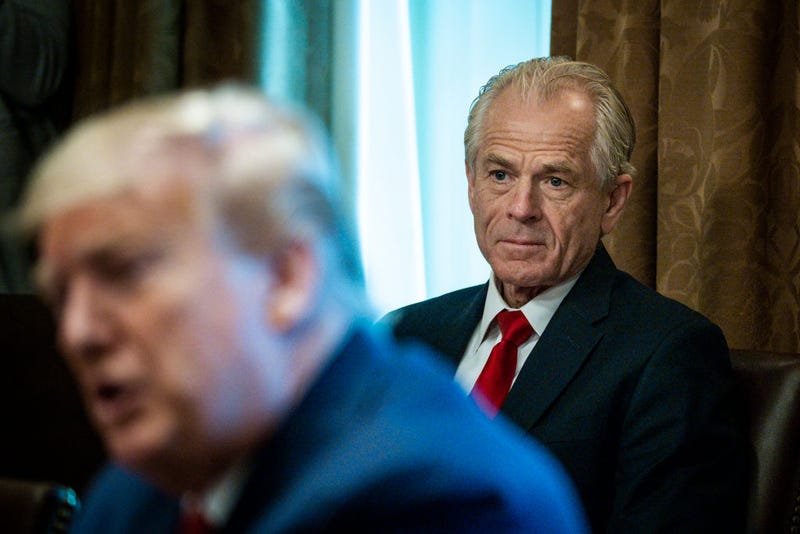
Senior Trump administration advisors privately discussed how the government was already making “critical mistakes,” handling the coronavirus before the World Health Organization declared a global COVID-19 pandemic last March.
According to the Washington Post, virologist Steven Hatfill and former President Donald Trump’s trade director Peter Navarro corresponded on Feb. 29, 2020 regarding the virus, just hours after Trump told a South Carolina rally crowd that coronavirus was a “hoax” politicized by Democrats.
Emails between the two men were obtained by the House select subcommittee on the pandemic, said the outlet. Previously, this Democrat-led panel looked into Navarro’s management of more than $1 billion in coronavirus supply contracts. It has also been probing possible political interference by Trump officials at the Centers for Disease Control and Prevention as well as other agencies.
“In truth we do not have a clue how many are infected in the USA. We are expecting the first wave to spread in the US within the next 7 days,” wrote Hatfill to Navarro. Trump on the other hand told rally attendees that 15 people were infected nationwide.
“This will be accompanied by a massive loss of credibility and the Democratic accusations are just now beginning,” Hatfill told Navarro. “This must be countered with frank honesty about the situation and decisive direct actions that are being taken and can be seen in the broadcast news.”
However, what happened next did not line up with his suggestions, according to the emails.
At the early stages of the pandemic, Hatfill believed the CDC rolled out flawed tests. He told Navarro to work on purchasing more testing supplies, to look into alternatives to immediately screen for the virus and to deploy emergency response staff.
Navarro then privately warned Trump in a March 1, 2020 memo that the federal response was “NOT fast enough,” despite what the president had told supporters about the county’s “amazing response.” Though Navarro warned that the coronavirus could become a very serious public health emergency, Trump continued to downplay the risks of the virus in public and assured Americans that it was being contained, said the Washington Post.
“We are, really, very highly prepared for anything,” Trump said in a March 6 visit to the CDC. He also claimed that tests were available to anyone, though testing shortages would persist for weeks, according to the outlet.
In March, Navarro and Hatfill strategized on White House memos using personal email accounts. They discussed pandemic preparations and discussed plans to scale up the U.S. health system’s coronavirus response, including a way to increase access to N95 masks.
“These exchanges add to the growing body of evidence that the Trump Administration knew the significant risk posed by the coronavirus but failed to execute an effective strategy to reduce the loss of American lives,” Rep. James E. Clyburn (D-S.C.) of the subcommittee wrote Tuesday to Navarro, when Clyburn requested all documents in Navarro’s posession related to the government’s response last year.
Additionally, Clyburn is seeking details on Navarro’s compliance with federal records law and Trump officials’ use of personal email accounts. According to Clyburn, the subcommittee has obtained more than 80 messages related to the government’s coronavirus strategy that Navarro sent to White House staff using a personal ProtonMail account.
“The Select Subcommittee seeks to understand what the leaders in the Trump Administration knew, when they knew it, and how their decisions may have contributed to the catastrophic loss of life,” Clyburn wrote Tuesday.
Emails released by the subcommittee also show that Navarro and Hatfill collaborated on a planned May 2020 presentation to encourage the use of hydroxychloroquine, an antimalarial drug, as a treatment for COVID-19.
Dr. Anthony Fauci – director of the National Institute of Allergy and Infectious Diseases and current President Joe Biden’s chief medical advisor – did not support promoting the drug, citing a lack of evidence that it worked to fight the virus.
The Washington Post said Navarro and Hatfill, repeatedly attacked Fauci in the emails for his “outrageous bias” and other alleged mistakes. There were also emails last July to Hatfill and Navarro regarding Federal Trade Commission scrutiny of mask manufacturer VPL, the subject of a ProPublica investigation.
Hatfill told the Washington Post he stands by his stance that the U.S. was not prepared for the COVID-19 pandemic. He blamed Fauci for giving Trump misleading advice and said that federal officials often downplay public health crises.
“Historically, the government has been reluctant to fully inform the public in hopes of quelling panic,” Hatfill said in a statement, criticizing former President Barack Obama’s administration’s handling of the 2014 Ebola outbreak.
Navarro did not immediately respond to a request for comment, said the Washington Post. His memoir, “In Trump Time: A Journal of America’s Plague Year,” is set to be published by conservative outlet All Seasons Press Nov.
2.


